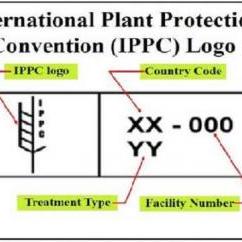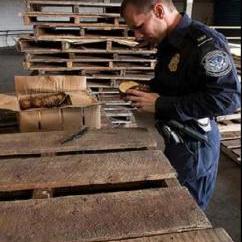
Non-Compliance Wood Packing Material
The Customs-Trade Partnership Against Terrorism (C-TPAT) program is one layer in U.S. Customs and Border Protection’s (CBP) multi-layered cargo enforcement strategy. Through this program, CBP works with the trade community to strengthen international supply chains and improve United States border security.
To enhance communication with its members, C-TPAT routinely highlights security matters for the purpose of raising awareness and renewing Partners’ vigilance in supply chain security matters.
The purpose of this C-TPAT Alert is to inform all C-TPAT Partners, particularly its sea carriers, of recent interceptions of non-compliant wood packing material (WPM) used in flat rack cargo carried by ocean vessels traversing the Mediterranean.
WPM is defined as wood or wood products (excluding paper products) used in supporting, protecting, or carrying a commodity. Some examples of WPM include: bins, cases, cratings, reels, load boards, boxes, containers, pallets, skids, dunnage and crates.
Snails and other pests may infest non-compliant wood packing material. These pests are regulated under the Federal Plant Protection Act. Snail infestations of WPM is just an example of a threat that targets the world’s agriculture and the Nation’ food supply. With the ever increasing amount of trade, the threat to U.S. crops and livestock is real.
The U.S. Department of Agriculture (USDA) amended its regulations in September of 2004 with the goal of decreasing the risk of plant pests being introduced into the United States. USDA has adopted the international standard for WPM, which was approved by the International Plant Protection Convention (IPPC) on March 15, 2002.
In accordance with the IPPC standard, most WPM is to be either heat treated or fumigated with methyl bromide and marked with an approved international stamp certifying the treatment. The final rule, which became effective on September 16, 2005, affects all persons using wood packaging material in connection with the importation of goods into the United States.
ALL IMPORTS (with certain exceptions) WILL BE DENIED ENTRY IF THEIR WOOD PACKING MATERIAL DOES NOT CONFORM TO THE IPPC GUIDELINES AND MARKING REQUIREMENTS.
The commodities with the highest incidence of WPM pests include: manifested WPM; machinery (including auto parts); metal products; and stone products (including tile).
Other high risk commodities include electronics and electronic components, finished wood articles, plant products and foodstuffs.
As a C-TPAT Partner, your vigilance is paramount in defending the U.S. against possible agro-terrorism. Importers should require IPPC compliance from their overseas supply chain partners and report any suspected invasive pests to CBP and USDA’s Animal and Plant Health Inspection Service (APHIS).
What action can you take on WPM if encountered at your location? Follow through with the SIN principle: S = Secure I = Isolate N = Notify
Visit the APHIS USDA website for more information on compliance with regulations on WPM.
http://www.aphis.usda.gov/wps/portal/aphis/home/
| Attachment | Size |
|---|---|
| C-TPAT Alert - WPM - July 2014.pdf | 539.51 KB |
- Login to post comments



Recent comments
9 years 3 weeks ago
9 years 23 weeks ago
9 years 27 weeks ago
9 years 30 weeks ago
9 years 31 weeks ago
11 years 50 weeks ago
12 years 12 weeks ago
12 years 32 weeks ago